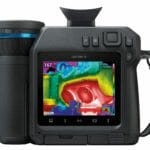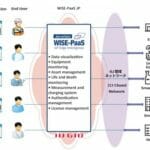Since its inception in the late 1950s, technical trade moulder Broanmain Plastics has invested in its people. For the family-run business, upskilling and supporting staff in achieving their fullest potential and career goals, underpins its ongoing success.
Their longest serving staff member, Len Walker, joined the company way back in 1959. Now working three days a week, he has taken the most recent apprentice -Kamil Stec -under his wing, imparting smart nuggets of information, including 60-years-worth of engineering, tooling and plastic moulding knowledge. Kamil, meanwhile, appreciates the bond the two have formed working in Broanmain’s toolshop. In particular, the apprentice enjoys sharing with Len modern-day engineering and CAD design techniques learned on-the-job and at East Surrey College where he studies one day a week.
Both applicants initially regarded their positions with the Dorking-based moulding firm as work stopgaps. Aged 16, Len had aspirations to become a mechanic. Joining MRA, as the company was then known, was for him a fill-in job. He recently celebrated his sixtieth year with the firm. Apprentice Kamil joined as a temporary worker three years ago. Starting out in Broanmain’s finishing department, this summer Kamil completes his Level 3 in Mechanical and Manufacturing Engineering. He hopes eventually to become a toolmaker.
While plastic moulding technology has evolved considerably throughout the decades, both Len and Kamil respect the importance of understanding the engineering basics. Back in the late 50s, plastic moulding, predominantly mass-produced compression plastics, really started to gain traction.
A teenager at the time, Len recalls: “It was post World War II. Metal was in short supply having been allocated to military operations. There was high demand for more cost effective plastic components to be mass-manufactured.”
Throughout the era of Bakelite plastic, Len worked as a maintenance engineer and fitter for the compression press. Even today, Len says that the company still undertakes compression moulding projects. The team also uses traditional laser machines, mills and tools to create inserts. Len explains: “Although CNC machines are predominantly used, it’s always handy to have tools like these at our disposal.”
Breaking with tradition
Len also believes that the same is true for traditional engineering and problem solving skills. “It doesn’t mean we are any less innovative. But when people today have basic engineering knowledge it means that they aren’t reliant on just tapping information into a programme.”
Knowing how to take measurements off a lathe or understanding the speed to cut metals are just several examples where Len cites the importance of having basic engineering knowledge. “It’s like riding a bike. You have to learn how to do it before you can start peddling,” emphasises Len.
Kamil, whose current role involves repairing, maintaining and modifying tools, agrees. He adds that while some of the new CAD design and coordinating machines make it easier and faster to take measurements, he still uses hand tools, a granite surface plate and digital test indicators on a regular basis. “From a engineering perspective, my role is still very much focused on solving problems and coming up with a better way to complete a task.”
Using the Electrode Discharging Machine to cut out tool sections is one example of a traditional high precision tool that Kamil had to rapidly get to grips with. “Moulding tools are by nature hard materials that cannot be recalibrated. I use the EDM to cut out inserts or create mould tool cavities. Much of this is automated, although selecting the right settings is critical. And that’s when my mechanical engineering knowledge is tested.”
Other tricks and techniques that Len has passed onto Kamil include the easiest way to strip a tool and how to safely prise open, how to sharpen a drill piece, plus ways to protect tools from corrosion. “Part of my training has been to observe Len and shadow him. When I watch him working on the manual machines, the speed in which he performs a task utilises decades of experience, and looks almost instinctive.”
Passing the knowledge baton
Nearing the end of his apprenticeship, Kamil claims that when other team members approach him for advice he feels a sense of pride. “Working in plastics processing is nothing like I had imagined it. Broanmain was my first employment when I moved to the UK. Although the engineering skills required are changing, what Len has shown me is the importance of learning a trade and how you can apply these timeless skills to different projects.”
Approaching 75, Len, who has no immediate plans to fully retire, adds: “Kamil is an extremely clever lad and very diligent. Although I have advised him on lots of different tricks, a lot of what he’s learned he’s picked up on his own. Equally, he’s taught me lots about newer technology. Passing on my knowledge has been an enjoyable experience. I like knowing that my wisdom is being put to good use.”
For some companies, managing a multi-generational workforce spanning Traditionalists to Gen Ys might be viewed as too challenging. Yet for Broanmain director Jo Davis, reverse mentoring is an excellent way to bring and hold onto different skill sets to the workplace.
Jo comments: “There is a typical view that experienced employees have more information to share. Yet, many younger employees have diverse experiences, including working oversees. In Len’s case, years of service equates to expertise. However, Kamil has different motivations and a hunger to accept new technologies as well as respect traditional skills. That’s why knowledge sharing top-down, bottom-up and laterally is so critical.”
Jo, a passionate advocate of mentoring, recently joined the British Plastic Federation’s Education & Skills Committee, and their Trailblazer Group for the Level 4 Manufacturing Engineering Technician Standard. “Tomorrow’s plastics industry needs people with a whole range of skill sets who, like Kamil and Len, are keen to make a difference,” ends Jo





